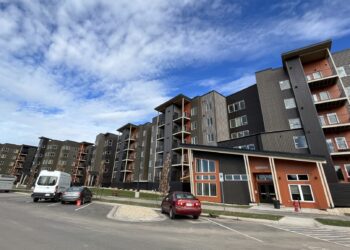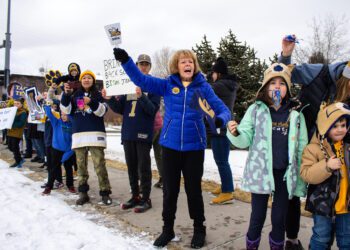By Gabrielle Gasser EBS STAFF
BIG SKY – From a steel skeleton in October to a roughed-in building ready for siding, construction of the new BASE community center in Town Center is visibly progressing.
BASE, which stands for Big Adventure, Safe Environment, is slated to be open to the Big Sky community in January of 2022. The official timeline posted on Big Sky Community Organization’s website has the opening scheduled for December of 2021, which, according to Kate Ketschek, chair of the BSCO board, could still take place as a soft opening. She explained that “with how COVID-19 is impacting supply chains and the construction industry in general, we realistically think it will be January of 2022 when we’re ready for programming.”
When it’s completed, the building will feature a 1,300 square foot climbing wall, a bouldering area, a gymnasium as well as office spaces and facilities for four nonprofit organizations. The community center will also include a wide array of programs including youth activities, fitness classes, climbing courses, and most importantly, a central indoors space in which the Big Sky community can gather.
The first shovels broke ground in July of 2019 when the Big Sky Community Organization, which is heading up the project, held a ceremony in Town Center Park for Big Sky’s first community center. Vertical construction of the building officially began in in May of 2020.
Langlas and Associates is heading up construction and a construction committee consisting of BSCO staff, Ciara Wolfe, V.P. of philanthropy for the Yellowstone Club Community Foundation, and Chad Wilson, director of construction at Big Sky Resort, among others, is overseeing the project. The Big Sky Skating and Hockey Association and the Big Sky Arts Council, two organizations that need the park space to continue with their missions and programming, are also involved.
Dan Ross, project superintendent with Langlas and Associates, is pleased with the progress to date. “All our mechanical, electrical and plumbing are roughed in on the second floor and all of our hydronic heat is roughed in on the first floor,” Ross said.
Even amid a global pandemic that has caused concrete prices to soar and supply chain disruption, BASE construction has continued largely unhindered.
“Delays in materials or procurement of materials can be a little frustrating,” said Ross, “[but] overall the project is going very well. We’re right on track and everything’s going smoothly.”
The new BASE building will be Leadership in Energy and Environmental Design, or LEED, certified, meaning construction follows a set of guidelines to build an environmentally responsible building. Some green features will include solar panels on the gymnasium roof, a green roof on the first floor and 55 geo wells that will help to regulate the temperature of the building.
“It’s a very complex building,” said Ross, noting that earthquake resistant features add to the complexity. “The architecture and the engineering that went into it is amazing. The other aspect of that is the Platinum LEED goal that we’ve set and integrating all those systems that help conserve energy and benefit the building.”
Fifty-five geothermal wells have been drilled 450 feet into the ground all around the park and help circulate air through tubes to maintain a baseline temperature of 55 F in the building, according to Ross.
In addition, according to Ross, the building is designed to reduce waste so there will not be a lot of construction debris and a lot of it will be recycled.
The need for a community center was originally identified in a 2017 needs-assessment survey conducted by BSCO and then-CEO Ciara Wolfe. In that survey, Big Sky residents identified a community center as their No1priority in a Big Sky Parks and Open Space Plan compiled by BSCO.
In December of 2018, BSCO bought the land in Town Center Park and the adjacent gravel parking lot to secure parkland for the community center. Then, in April of 2019, the organization launched the most ambitious fundraising effort Big Sky has seen to date, “ALL IN. BIG SKY,” which netted over $20 million.
According to Ketschek, the nonprofit will hold one last fundraising push in the fall of 2021 to cover any outstanding costs the project may incur.
“We’ve been working really hard,” Ketschek said, “assigning tasks so every employee at BSCO is very connected to getting BASE open right now.”
Though BASE will not be open until next January, Len Hill Park , the 3.3-acre parcel encompassing BASE, the ice rink and the area formerly known as Town Center Park purchased by BSCO in 2018, will open, new-and-improved for the summer of 2021. The expanded park will feature an updated stage, new sod and a landscaped boundary according to Ketschek.
“We are so grateful for the vision of our past CEO, Ciara Wolfe, in partnership with the previous landowner, the Simkins family, and donor, the Leonard Hill Charitable Trust, to have the opportunity to protect this community space in perpetuity,” Ketschek said.
In addition to the current features, there is talk of expanding the community center in the future, including the potential of a swimming pool, which would likely be built on the land where the tennis courts are currently located purchased by BSCO in January of 2020. In the initial survey, the Big Sky community identified the desire for a pool, but a more immediate need for a community space to gather in, according to Ketschek.
In January of 2021, BSCO purchased land in the community park along Little Coyote Road where the tennis courts are currently located in anticipation of Phase 2 construction.
“We felt it was most fiscally responsible to get BASE up and running and grow the membership before looking to Phase 2,” Ketschek said. “Once we accomplish that, we’ll begin to gather community input as to what Phase 2 could look like.”
She also added that BSCO has already secured enough single-family equivalents, or water rights, to construct a pool if the Big Sky community expresses that desire in Phase 2.
“It’s such a huge move forward in our community,” Ketschek said. “Especially during COVID, it’s really come to light how much of a need there is for increased programming from kids to adults. Having a safe place for kids, it’s going to be an alcohol-free building and behavioral health will be tied [in] which is really important for our community.”











